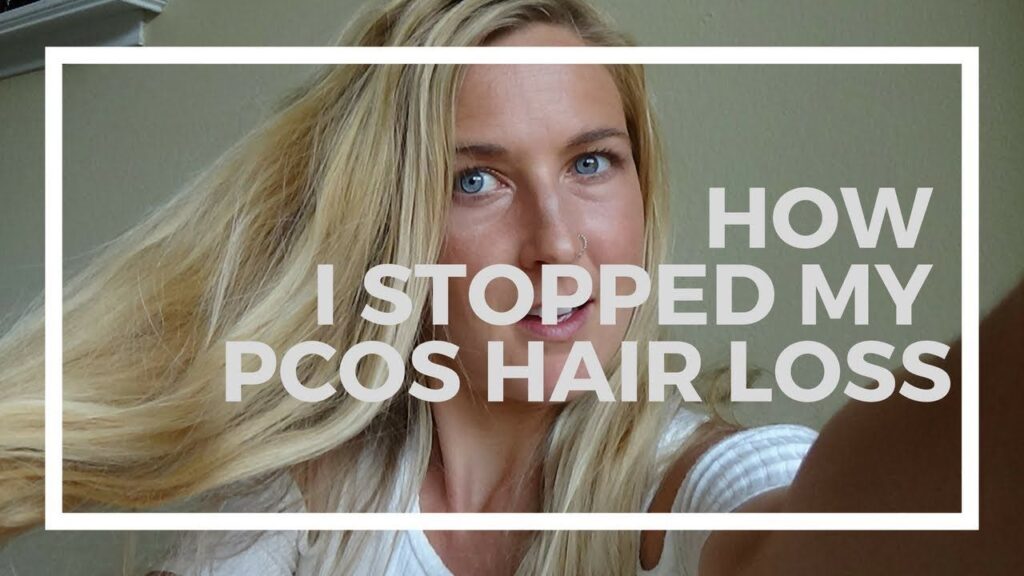
PCOS can cause many additional symptoms, including hair loss; however, it is most commonly linked to reproductive problems, including irregular periods and infertility. Even though not all PCOS patients have hair loss, it is thought to be a prevalent symptom of the condition. However, it is thought that hormonal imbalances, particularly high levels of male hormones (androgens) like testosterone, are responsible for PCOS-related hair loss, so there is an important question to be answered: can hair loss due to PCOS be reversed?
The actual processes behind this condition are still unknown. Androgenic alopecia (female-pattern hair loss) is a disorder that is characterized by the thinning of the scalp’s hair and is brought on by high amounts of androgen. Typically, PCOS hair loss has a diffuse pattern, which means it affects the whole scalp rather than just a few spots. Women could see more hair shedding, a wider part line, or a gradual loss of hair density. It may significantly affect a woman’s quality of life and sense of self-worth. The underlying hormonal abnormalities must be treated to control PCOS-related hair loss. A healthy weight, frequent exercise, and adherence to a balanced diet are a few examples of lifestyle changes that may be part of a treatment plan.
Hormone levels can be controlled, and hair loss can be slowed down, by using medications like oral contraceptives or anti-androgens. Additional methods for promoting hair growth include topical medications like minoxidil. Women who have hair loss as a sign of PCOS should speak with a medical expert for a precise diagnosis and an individualized treatment plan.
Understanding whether PCOS is to blame for hair loss is crucial!
Women struggling with this condition must know whether hair loss brought on by polycystic ovarian syndrome (PCOS) may be restored. Despite the fact that PCOS-related hair loss can be upsetting and have a negative influence on self-esteem, it is important to have reasonable expectations about how it might be reversed. In many situations, hair loss could be retarded or even stopped with adequate care for PCOS and its underlying hormonal abnormalities. By making lifestyle adjustments to address hormonal imbalances, including eating a nutritious diet, exercising frequently, and maintaining a healthy weight, one may be able to increase hair growth. To treat PCOS symptoms and maybe encourage hair development, doctors may also prescribe drugs like anti-androgens or oral contraceptives.
Realistic expectations and patience with the process are crucial. It may take some time before you see any noticeable effects from your hair restoration. The effectiveness of treatments may be assessed, and additional changes can be guided as needed with regular attention by a practitioner and consistent adherence to the prescribed treatment plan. Knowing that PCOS has the ability to reverse hair loss enables women to take control of their situation, seek the right therapy, and keep a positive attitude during the regeneration process. Find the proper answer to the question, “Can hair loss due to PCOS be reversed?” with the help of a skilled Dt. Rukhsana Azhar!
Factors affecting the Reversal of Hair Loss
Numerous variables may have an impact on the reversal of hair loss. First and foremost, the root cause of hair loss is crucial. Whether the fundamental reason is hereditary, hormonal, dietary, or caused by particular medical problems, treating it is essential for a complete reversal. Second, the technique of therapy is crucial. Options include both prescription drugs like finasteride and minoxidil as well as surgical techniques like hair transplants.
Furthermore, lifestyle elements, including food, levels of stress, and hair care routines, might affect the quality of your hair. Reversing hair loss can be aided by eating a balanced diet, controlling stress, and using gentle hair care techniques. In the end, a complete strategy that includes targeted therapies, attending to underlying reasons, and adopting a healthy lifestyle can increase the likelihood of hair loss reversal.
Dietitian’s Role: Seeking expert Advice and Assistance
In order to manage PCOS-related hair loss, a licensed nutritionist is essential. When creating a diet that addresses the underlying hormonal disorders and encourages hair regeneration, they may offer invaluable direction and assistance. A dietician can help reverse PCOS-related hair loss in the following ways:
- To evaluate your current eating patterns, nutrient consumption, and any nutritional deficiencies that could be causing hair loss, a dietitian will do a thorough nutritional examination. Additionally, they will examine your individual requirements, preferences, and medical background.
- A dietitian will concentrate on altering food to balance PCOS-related hormones. Given that insulin resistance is typical with PCOS, they can suggest a best diet plan that encourages stable blood sugar levels. This usually entails eating full, unprocessed foods, limiting carbohydrate intake, and including enough protein and good fats in the diet.
- Essential elements including minerals, vitamins, and antioxidants are crucial for maintaining healthy hair. The consumption of essential nutrients such as iron, zinc, vitamin E, vitamin D, and omega-3 fatty acids will be optimized by a nutritionist through dietary changes or supplementation as needed.
- PCOS is frequently linked to difficulties with weight management. If necessary, a best nutritionist can assist in creating a customized weight management strategy that emphasizes slow, sustained weight loss because carrying too much weight can lead to hormonal disorders and hair loss.
- In addition to food adjustments, a dietitian may offer advice on lifestyle changes, including exercise regimens, stress-reduction strategies, and enough sleep, all of which support general hormonal and health balance.
Working with a certified dietitian will enable you to receive individualized nutritional advice and assistance to tackle the underlying PCOS-related reasons for hair loss, and find an appropriate answer to the question, “Can hair loss due to PCOS be reversed?”, eventually, boosting hair growth and general well-being.
Suggested Read: How Do I Reverse Insulin Resistance In PCOS?

Hello My Name is Dt. Ruksana Azhar and I am a certified dietician and providing online & offline services for Weight Management, PCOS/PCOD Management, Diabetes Management , etc. I have 12+ years of experience in the Apollo Hospital Delhi , Max Super Specialty Hospital Delhi, Lilavati Hospital Mumbai and VLCC healthcare Mumbai. I loves to write healthcare and lifestyle related blog. My favorite part of being a doctor is the opportunity to directly improve the health and wellbeing of my patients and to develop professional and personal relationships with them.



